Overview
Crunches do not effectively aid in weight loss through spot reduction of belly fat, as recent research indicates that while they strengthen the core, they do not significantly decrease subcutaneous fat in that area. The article supports this by referencing studies that emphasize a holistic approach to weight loss, which includes overall body fat reduction through a combination of aerobic exercises, strength training, proper nutrition, and adequate rest, rather than relying solely on localized exercises like crunches.
Introduction
In the quest for effective weight loss, many individuals find themselves drawn to quick fixes and targeted exercises, such as crunches, in the hope of achieving a flatter belly. However, the reality is far more complex. Recent research has debunked the myth of spot reduction, revealing that localized exercises alone cannot significantly diminish fat in specific areas. Instead, a holistic approach that incorporates:
- A balanced diet
- Regular physical activity
- Mental well-being
is essential for sustainable weight loss. This article delves into the multifaceted strategies required to foster a healthier lifestyle, emphasizing the importance of comprehensive wellness initiatives that empower individuals and organizations alike to prioritize overall health. By understanding the interconnectedness of nutrition, exercise, and mental health, HR Benefits Managers can champion a culture of well-being that not only enhances employee engagement but also drives lasting results in weight management.
The Myth of Spot Reduction: Can Crunches Really Target Belly Fat?
A common misconception among fitness enthusiasts is that many wonder if do crunches help you lose weight, as they believe it can specifically target belly fat. However, recent studies have dismantled this myth, demonstrating that the question of whether do crunches help you lose weight through spot reduction—losing fat from a specific area via localized exercise—is largely unfounded. A notable study published in the Journal of Strength and Conditioning Research underscores that while abdominal exercises like crunches effectively strengthen the core, they do not significantly impact subcutaneous fat reduction in that region.
In fact, research shows that understanding whether do crunches help you lose weight is part of the holistic approach needed to achieve visible changes in belly fat, which involves overall body fat reduction. For instance, a case study by van Aggel-Leijssen et al. involving 24 participants with an average age of 43.3 years highlighted the effectiveness of various aerobic interventions over 8 weeks, emphasizing the importance of comprehensive fitness strategies.
As a result, while adding crunches to a fitness routine can improve core strength, it is essential to recognize that the question of do crunches help you lose weight should not lead to relying exclusively on them for effective fat reduction. As noted by Quist et al., the mean age of participants in many studies is around 35 years, indicating that fitness strategies should be tailored to demographic factors. Emphasizing a balanced exercise routine alongside proper nutrition can lead to more substantial and lasting results.
Furthermore, it is crucial to consider the accuracy and reliability of the sources we refer to; as stated by BMJ, they do not warrant the accuracy of translated materials, underscoring the need for credible research in fitness.
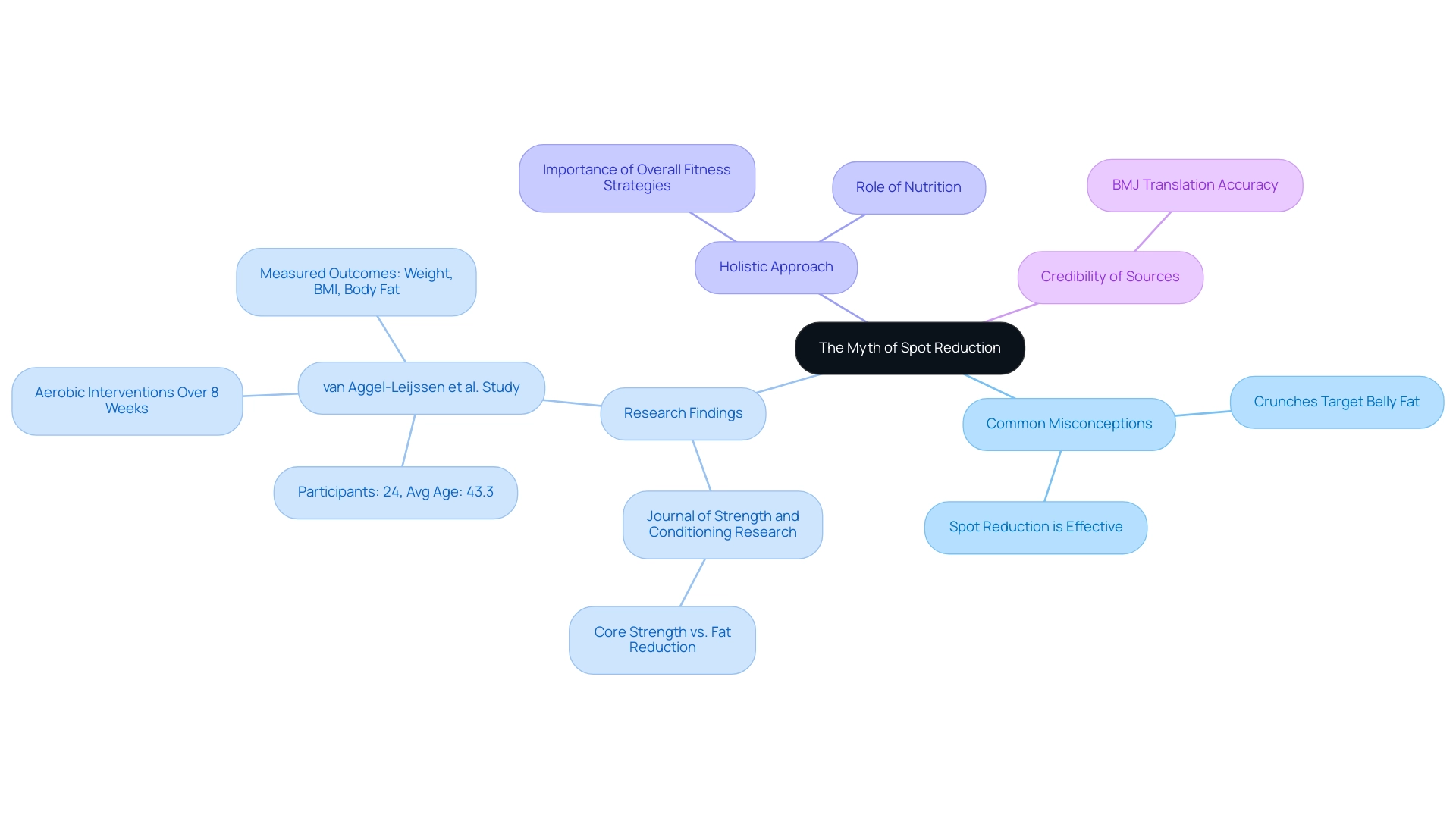
A Comprehensive Approach to Weight Loss: Beyond Crunches
To attain successful reduction and improve overall health, individuals must adopt a thorough approach that goes far beyond basic exercise habits. This approach encompasses:
- A balanced diet abundant in whole foods
- Regular cardiovascular activities
- Strength training
- Essential rest periods
Recent studies confirm that incorporating these elements promotes more sustainable reductions in mass.
For instance, research published in the American Journal of Clinical Nutrition reveals that participants engaging in both aerobic and resistance training experienced significantly greater fat reduction compared to those who concentrated on just one exercise modality. Furthermore, adequate sleep plays a crucial role in managing body mass; studies show that dieters who are sleepless for 14 days lose 55% less fat. Additionally, adopting healthy habits such as maintaining proper hydration and managing stress levels can markedly improve weight loss outcomes.
By using our extensive coaching application, employees can access tailored workouts, dietary advice, and daily plans, all created to assist them in reaching their fitness objectives effectively. The app includes video demonstrations for visual learners, ensuring exercises are performed correctly, and movement flows to keep the body active and engaged. As Jeff White, Business Development Director at Deutsch, noted, "One of the biggest challenges we face is the need to get smart on a business or category real quick... We need to do that often in a matter of days, so it’s not a small ask."
By championing a culture of health that prioritizes these multifaceted strategies, organizations can empower their employees to meet and exceed their health goals. Moreover, consider investing in corporate partnerships with Foresight Health Coaching to enhance team culture and promote employee health, taking the first step towards a healthier, happier workplace. Notably, in 2023, Mounjaro brought in nearly $5.2 billion, highlighting the financial impact of health-related products and services in promoting wellness.
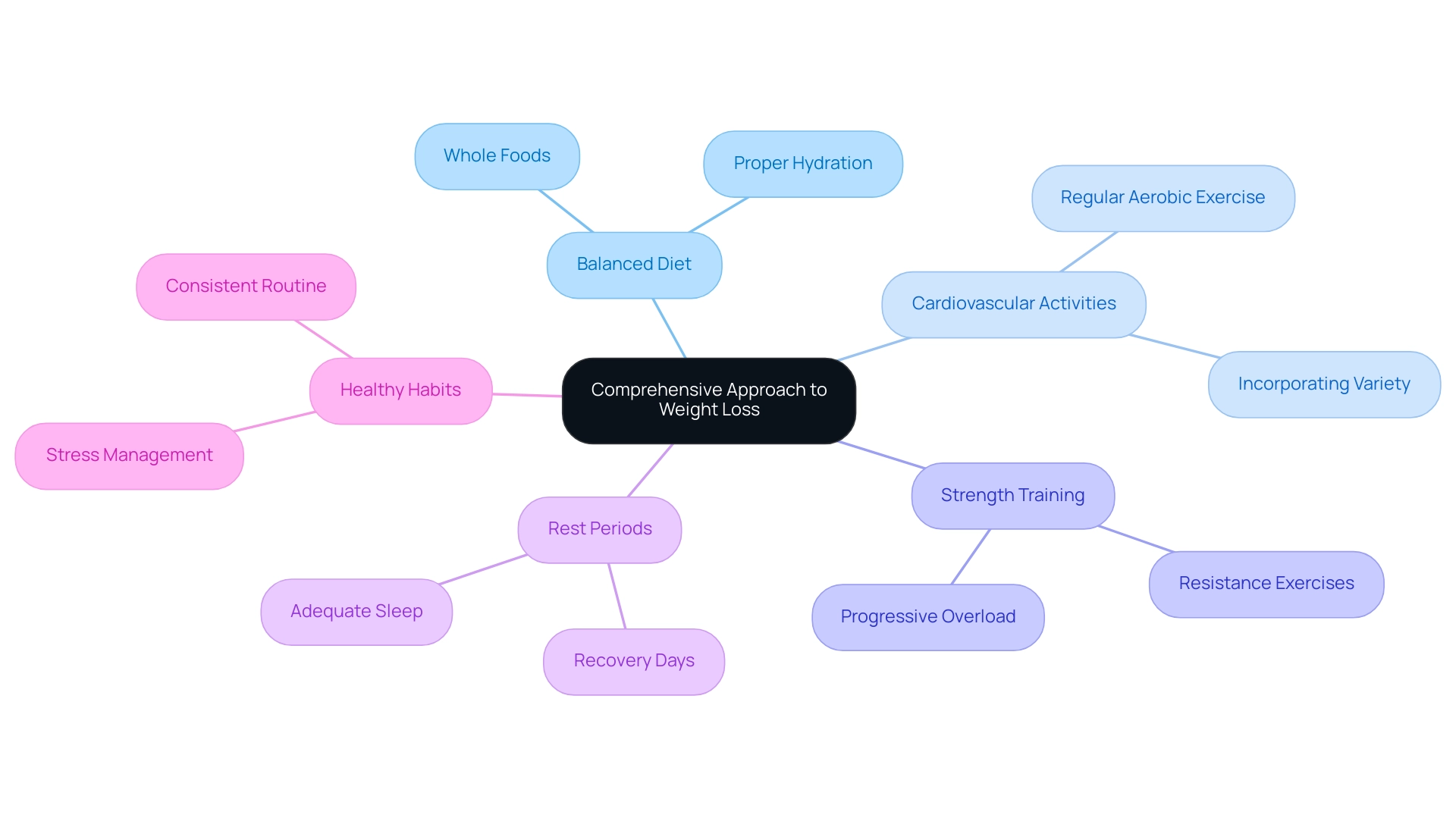
The Role of Nutrition in Weight Loss
Nutrition is a fundamental aspect of effective reduction and overall well-being. Emphasizing a diet rich in fruits, vegetables, lean proteins, and whole grains can significantly improve efforts to reduce body mass. Current research underscores the effectiveness of fiber-rich diets, showing that they promote greater satiety and reduce overall calorie intake.
For instance, studies published in Nutrition Reviews indicate that individuals consuming low-processed and high-fiber foods experience heightened feelings of fullness, making it easier to adhere to reduction goals. It is particularly important to address obesity within specific demographics, as 7.9% of Hispanic adults have severe obesity, highlighting the need for targeted nutrition strategies. Moreover, adequate sleep plays a critical role in weight loss; according to Loudcloudhealth, when dieters are sleepless for 14 days, the amount of weight they lose from extra fat lowers by a stunning 55%.
This emphasizes the importance of a multifaceted approach that includes both nutrition and sleep. Practical strategies such as meal planning and mindful eating empower individuals to make healthier food choices consistently. Organizations can play a pivotal role in this journey by offering access to Foresight Health Coaching's comprehensive nutrition education and resources.
Their corporate membership includes:
- In-person discussions on well-being
- Pantry and nutrition services
- Access to their fitness app, enhancing connectivity among employees
Initiatives like workshops and personalized wellness programs not only support employees' well-being but also foster a culture of wellness. By prioritizing nutrition, along with sufficient rest, HR Benefits Managers can motivate their teams to achieve lasting reductions in body mass and improve their overall well-being through committed coaching and assistance.
To explore how Foresight Health Coaching can specifically meet your organization's needs, consider attending one of our workshops or contacting us for a personalized consultation.
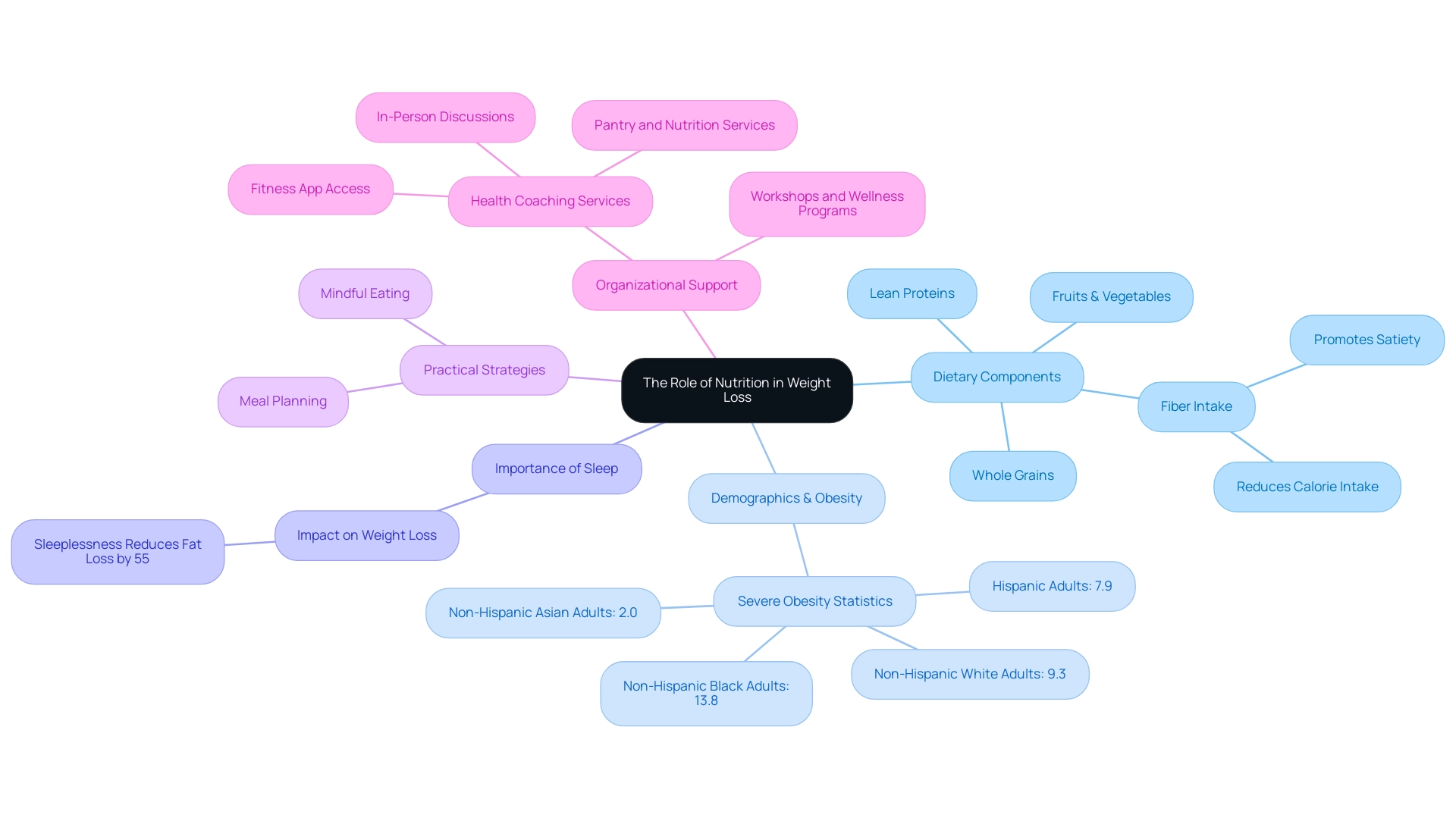
Incorporating Physical Activity into Daily Routines
Integrating physical activity into daily routines is a pivotal step in fostering a healthier lifestyle. Even minor adjustments—like opting for stairs instead of elevators, biking or walking to work, or dedicating short intervals for stretching during the day—can lead to remarkable increases in daily activity levels. Organizations play a crucial role in this transformation by cultivating a culture that champions movement.
Initiatives such as walking meetings or the introduction of standing desks can significantly enhance employees' engagement in physical activity. Recent insights have shown that nearly 731,272 Americans embraced cycling as their primary mode of transportation to work in 2022, illustrating a growing trend towards active commuting. Additionally, key statistics reveal age-adjusted percentages of adults meeting physical activity guidelines vary significantly by urbanization level and demographic factors, underscoring the need for tailored approaches to promoting activity.
Furthermore, the American Journal of Preventive Medicine emphasizes that even small increases in daily activity can yield substantial benefits for well-being and assist in effective weight management. A related case study shows that in 2023, 9,374,018 registrants participated in races, reflecting a substantial engagement with physical activities, including cardio exercises. As Maren Hale aptly notes, setting and achieving exercise goals can inspire others to take control of their well-being, proving that the key to longevity and a fulfilling life lies in consistent physical activity and mindful living.
With the forthcoming WHO guidelines on physical activity and sedentary behavior expected for 2030, it is vital for organizations to adopt these initiatives now, paving the way for enhanced employee wellness and overall well-being.
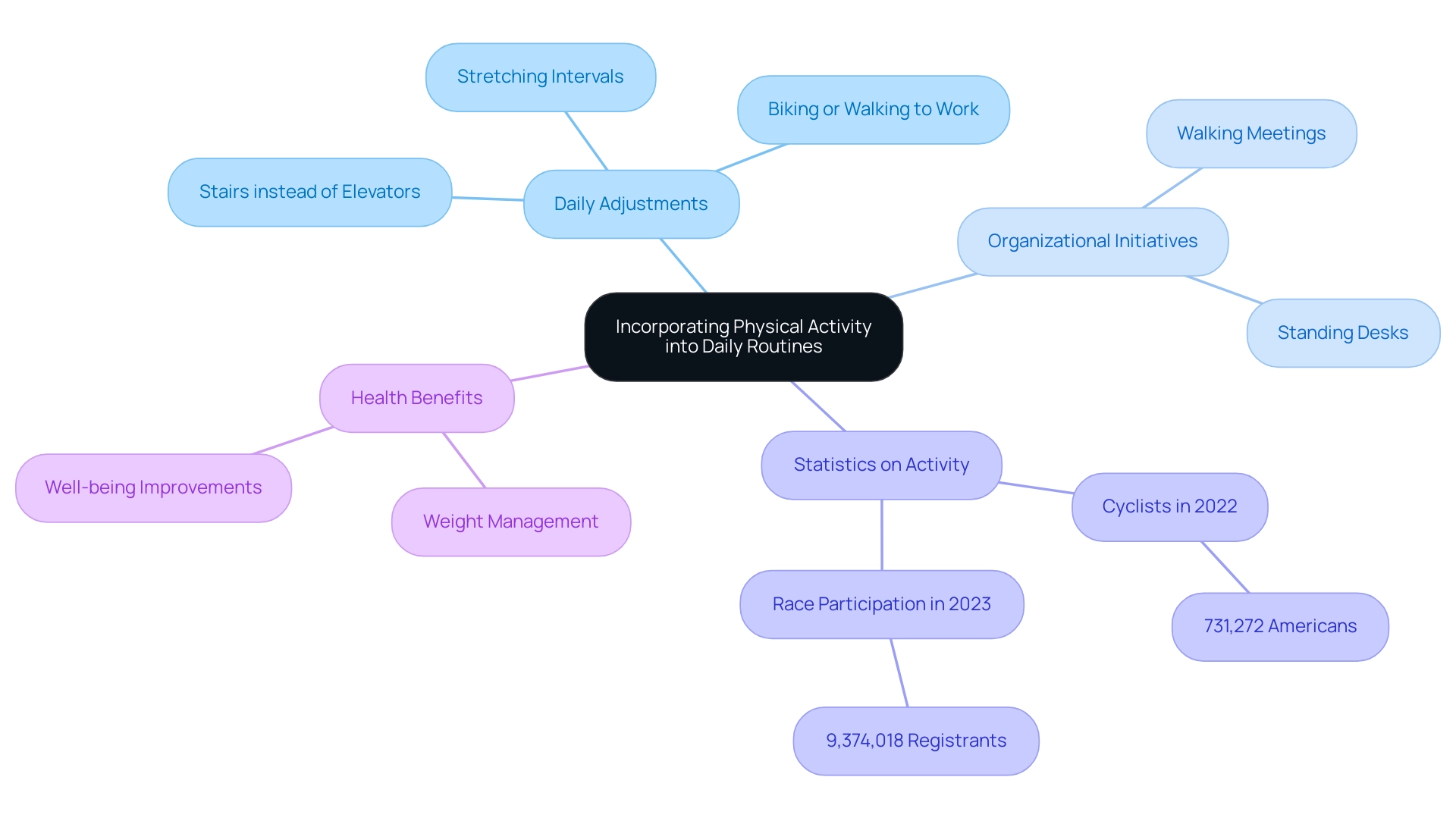
The Importance of Mental Health in Weight Management
Mental well-being is a crucial aspect of successful body management and overall wellness. Elevated stress levels can result in emotional eating and detrimental coping mechanisms, significantly obstructing loss efforts. Research indicates that individuals experiencing obesity have a 60% higher risk of mental well-being issues, emphasizing the importance of tackling these interconnected challenges.
Moreover, stigma and prejudice concerning size can exacerbate social and mental well-being challenges, including anxiety and negative body perception, complicating the path to successful management of body mass. By integrating stress management strategies—such as mindfulness, meditation, and consistent physical activity—employees can improve their mental well-being while gaining significant assistance in reaching their reduction goals. Organizations that prioritize employee well-being through access to mental wellness resources, like counseling services and wellness programs aimed at stress reduction, cultivate a healthier work environment.
Notably, a study published in the International Journal of Obesity found that those engaging in stress management practices are more successful in achieving and maintaining weight loss objectives. Furthermore, the shortage of mental wellness professionals in rural regions, where 60% of counties lack a single psychiatrist, emphasizes the importance of accessible mental care. The alarming statistic from the National Vital Statistics System, which reported 49,476 suicide deaths in 2022, further emphasizes the public welfare concern tied to mental well-being.
As HR Benefits Managers, cultivating a supportive environment for mental health through customized health programs not only enhances confidence and stress-free health management but also results in significant improvements in your team’s overall health and productivity. Foresight Health Coaching offers evidence-based techniques and personalized support that address these challenges effectively. Our programs lead to reduced absenteeism and lower healthcare costs, creating a proactive approach to your bottom line.
Testimonials from our clients highlight the transformative impact of our corporate wellness initiatives, demonstrating increased engagement and loyalty among employees.
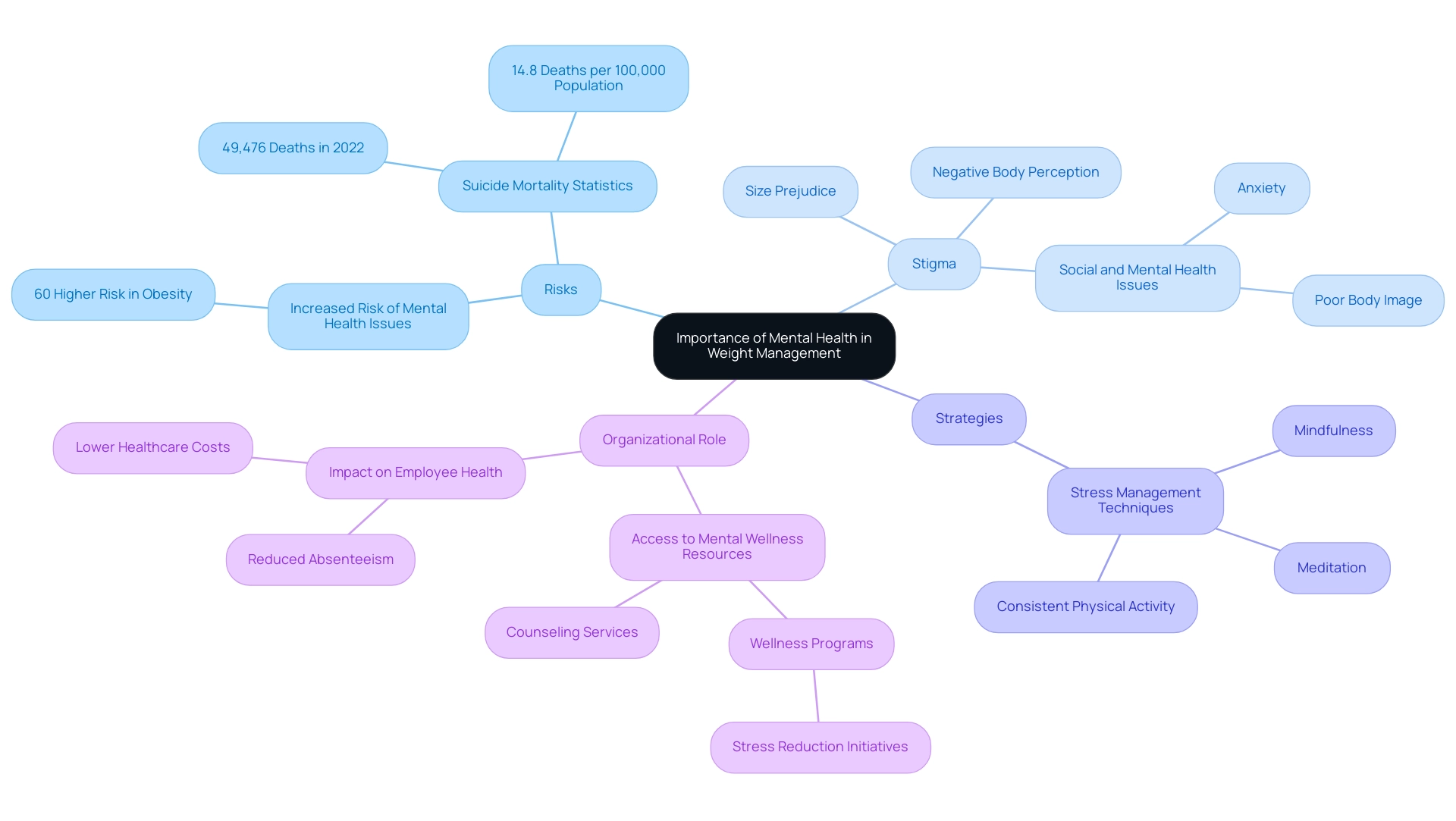
Setting Realistic Goals for Sustainable Weight Loss
Setting practical and attainable objectives is essential for lasting reduction. Rather than pursuing drastic transformations, individuals should focus on small, measurable objectives that pave the way for gradual progress. For instance, aiming for a loss of 1-2 pounds each week or incorporating just 30 minutes of exercise into their weekly routine can cultivate a feeling of achievement and drive.
A recent survey conducted from January 4 to 8, 2024, with 2,000 respondents, revealed that participants set a total of 9,501 goals, with:
- 45.8% identified as behavior goals
- 29.2% as outcome goals
This highlights a strong inclination towards actionable targets. Deborah F Tate notes, 'It will be helpful for future studies to include and evaluate this type of component to more clearly determine the extent that creating and achieving these personal goals have on behavioral performance, intervention engagement, and adherence.' This aligns with the research by Sheeran and Webb, which discusses the intention-behavior gap, emphasizing that individuals often struggle to translate their intentions into actual behavior.
Moreover, utilizing a comprehensive coaching app can greatly enhance this process by offering personalized workouts, nutrition guidance, and daily programming tailored to individual goals. Attributes like access to founders and coaches via our app, bi-weekly group calls, and community support are essential; specialists highlight that a comprehensive method to losing pounds—incorporating nutrition, mindset, and behavior modification—enables individuals to manage their wellness journeys effectively. Organizations can further enhance their team culture and employee health by exploring corporate partnership opportunities with Foresight Health Coaching, which fosters engagement and accountability.
Research consistently demonstrates that individuals who set specific, achievable goals experience greater success in their weight loss efforts, reinforcing the importance of a structured and supportive approach to wellness management. Don't miss out on the opportunity to try our transformative health coaching app with a free 7-day trial, designed to support your wellness goals and cultivate a thriving workplace environment. Contact us now to discover how we can partner together to nurture a stronger and more resilient team culture.
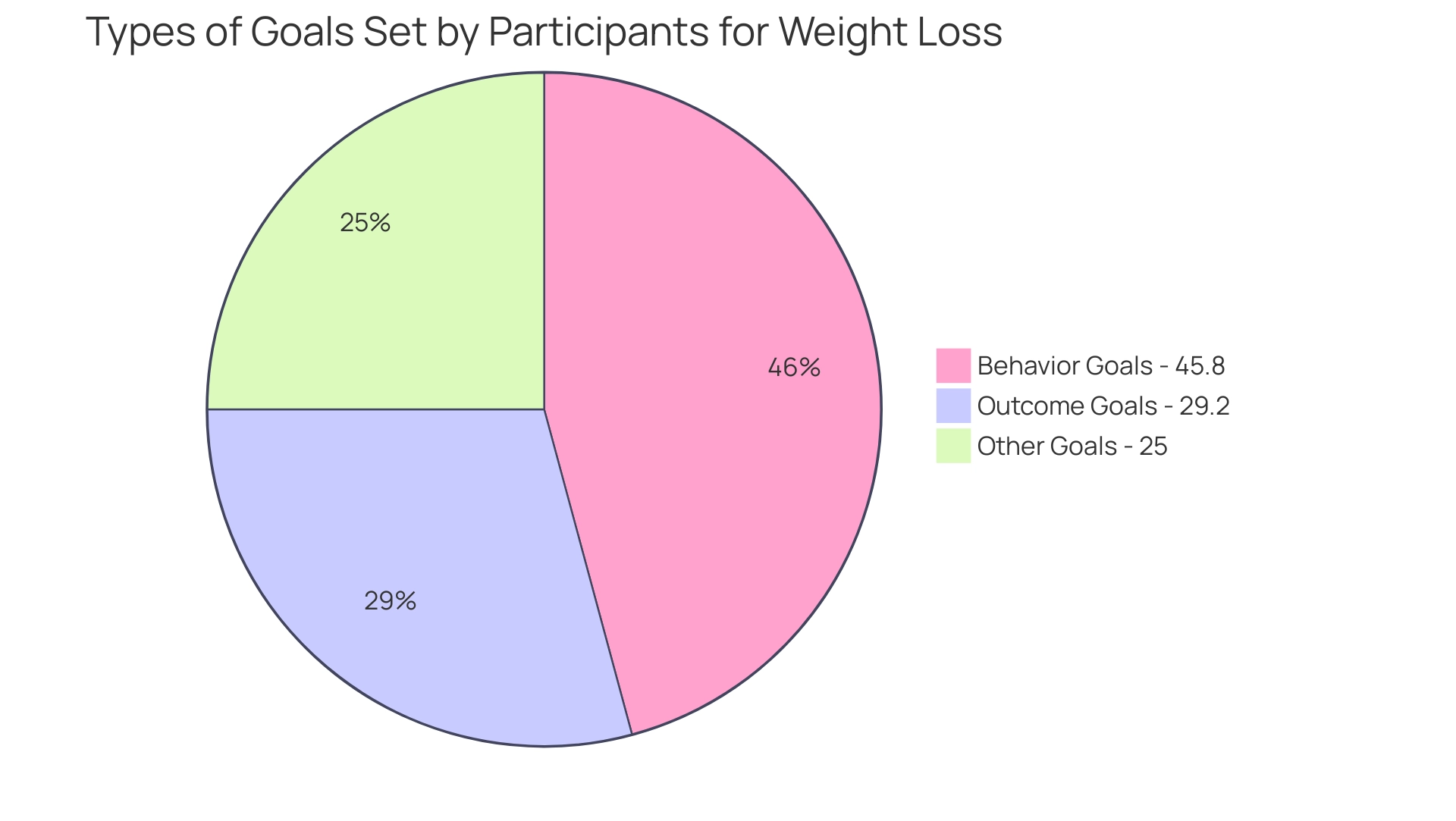
Conclusion
In the pursuit of effective weight loss, the understanding of holistic health is paramount. The myth of spot reduction, particularly the belief that exercises like crunches can specifically target belly fat, has been debunked. Recent research emphasizes that achieving a flatter belly requires a comprehensive approach that includes:
- Balanced nutrition
- Regular physical activity
- Mental well-being
By integrating these elements, individuals can foster lasting changes in their health and fitness.
A balanced diet rich in whole foods, coupled with regular aerobic and resistance training, forms the foundation for sustainable weight loss. Additionally, the significance of mental health cannot be overlooked, as stress management techniques play a crucial role in preventing emotional eating and supporting overall wellness. Organizations have a unique opportunity to cultivate a culture that prioritizes these multifaceted strategies, empowering employees to take charge of their health journeys.
Setting realistic goals is essential for long-term success. By focusing on small, achievable objectives, individuals can build momentum and motivation, leading to more significant health outcomes. Incorporating wellness coaching resources can further enhance this process, providing personalized support that aligns with individual goals.
As HR Benefits Managers, the call to action is clear: champion a workplace culture that embraces comprehensive wellness initiatives. By prioritizing nutrition, physical activity, and mental health, organizations can inspire their teams to achieve their health ambitions, ultimately leading to a more engaged and productive workforce. The path to a healthier future begins with a commitment to holistic well-being—now is the time to take action.




